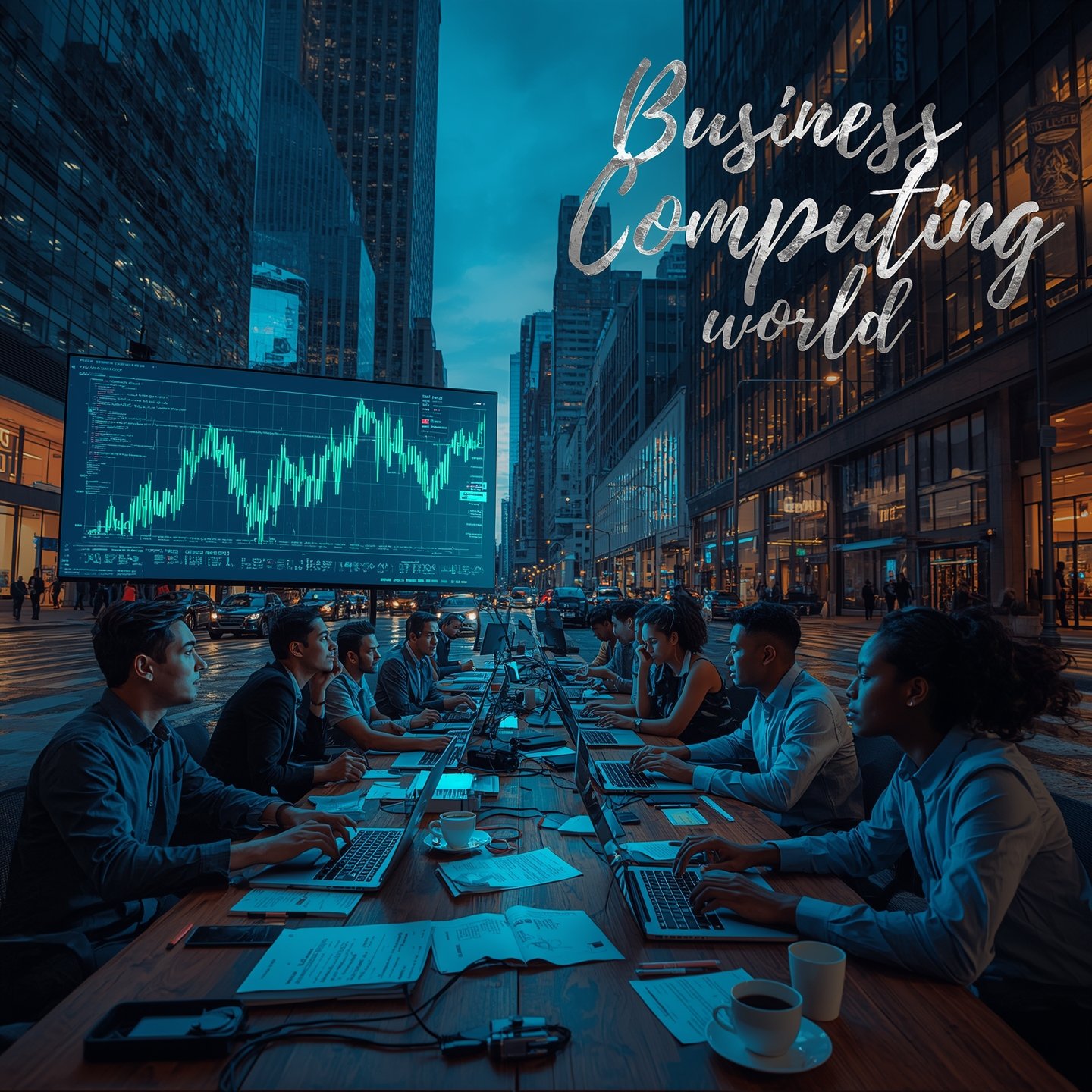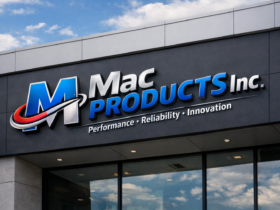With the current networked world, companies are finding it necessary to integrate technology to gain or maintain a competitive edge, optimize business processes, and drive overall growth. Business computing is one of the most important areas in which technology has its influence. The world of business computing is changing too quickly now, not only with cloud computing but artificial intelligence (AI) and blockchain as well. These techs are changing the way businesses work, make business decisions, and approach their customers.
Throughout this article we shall examine the several details of this business computing, its development, technologies involved in informing it, the advantages that it brings to the business arena and how organizations may use it to remain in the competitive arena. We shall also touch on frequently asked questions and issues in the implementation of business computing solutions by businesses. At last, we will end with the future of business computing and the way it could change industries.
So what is Business Computing?
Business computing entails the application of computer technology, software to facilitate businesses, data management, and streamlining. This entails a broad spectrum of technologies, including the use of hardware and software platforms, networks, databases, etc., through which businesses can explore efficient information management, collaboration, and customer engagement in the real-time environment.
With the increase in sophistication of business computing world and the technologies that they embrace, business computing has now encompassed topics such as artificial intelligence, machine learning, cybersecurity and blockchain.
How Business Computing Evolved
Business computing has undergone a long journey of transformation. As early as punch cards and mainframe computers to the present cloud-served applications, computing has become a part of the modern business environment. The remarkable stages of the evolution of business computing are as follows:
Mainframe Era:
Nevertheless, they took the initial steps to the digital revolution in business computing.
Personal Computers: During the 1980s personal computers (PCs) would start to appear giving businesses the opportunity to decentralize computer power. Computing was becoming accessible to organizations of smaller sizes which could now afford to own and operate their machines.
Networked Computing:
The emergence of the internet in the 1990s ushered in the era of networked computing. It was now possible to network computers in an organization and exchange data over local area networks (LANs) even through the Internet. File sharing, early versions of cloud computing, and email were beginning to become the focal points of operations in businesses.
Cloud Computing and SaaS:
With the 2000s came the cloud computing phenomenon that enabled businesses to have remote access to the software and infrastructure which is oftentimes on a subscription basis. Software as a Service SaaS caused a trend of Businesses to be able to Utilize such tools as CRM Accounting software and HR Management systems Without implementing a costly in House infrastructure.
Artificial Intelligence and Automation:
AI Solutions help in the analysis of data re Engineering processes and decision making Whereas automation technology Automates routine Maintenance tasks and Minimizes errors.
Blockchain and Cybersecurity:
Emergence of Blockchain technology, together with the vital need to support cybersecurity, has continued to influence business computing. Blockchain is set to increase transparency and safety in transactions with the emergence of cybersecurity as the latest tool to ensure important business data is not subject to cyber attacks.
Trend-setting technologies in Business Computing
Business computing has undergone numerous technology changes that have propelled businesses to perfect their operations, decision-making processes as well as ease customer experiences. Among the most relevant technologies in this area, one may distinguish:
Cloud Computing
Cloud computing has radically changed the manner in which firms store, process and manage data. Businesses can find software and services on-demand via remote servers lying on the internet and do not have to maintain on-premises infrastructure.
Cloud computing is available in three major types, i.e., cloud computing models.
Private Cloud: The unique cloud platform that an individual organization can use to have more control and security.
Hybrid Cloud: Hybrid Cloud is a mix of both the public and the private cloud infrastructure and is more flexible and a trade off between price and security.
Machine learning ML and Artificial Intelligence AI
Artificial intelligence and machine learning are increasingly playing an important role in the area of business computing, particularly in connecting the ability to automate, evaluate information and make smart decisions. Machine learning is a branch of AI that allows a system to learn with data and grow with knowledge.
Blockchain Technology
Blockchain holds the potential to enhance the supply chain management process reduce fraud streamline contracts using smart contracts and offer safe payment mechanisms. The fact that it can establish trust between two parties without any middlemen is also helpful especially to those companies whose operations depend on secure and transparent transactions finance healthcare and logistics.
Big Data and Analytics
Over the last few years, the data growth has been exponentially increasing and firms are looking more towards using big data and analytics tools to fetch valuable information. Enterprise computing gives organizations the ability to collect and store and analyze large data sources, which means they can make decisions that are data-driven.
Upon using the tools of advanced analytics, businesses can examine customer behavior, optimize promotion, predict demand, and enhance the efficiency of the operation. AI and machine learning-driven predictive analytics are also of specific value in terms of trend recognition and proactive business decision-making.
Cybersecurity
With cyber threats increasingly becoming advanced cybersecurity has become a more important element in business computing. Businesses are obligated to safeguard their own data, networks and other digital assets against cyberattacks, data breaches and other security lapses.
There are security measures that are used by businesses to protect sensitive information and these solutions include encryption, multi factor authorization firewalls and intrusion detection Systems. More organizations are shifting towards cloud based systems therefore it is important to consider data security in the cloud.
Robotic Process Automation RPA and automation
Robotic Process Automation (RPA) is the technology of automating business processes governed by constant human rules. This may be a physical entry of data and preparation of invoices, customer support, and personnel management work. Automation of these activities can help businesses in their efficiency in their operations in the reduction of expenditure and the expansion of human labour to other strategic tasks.
Automation is also being used in supply chain management, marketing campaigns and management communications with the customers to increase the level of productivity, as well as the absence of human error.
Advantages of Business Computing

The adoption of enhanced business computing solutions comes with a multitude of advantages for organizations. The following are some of the most important ones
Increased Efficiency and Productivity Automation cloud systems and AI-updated tools can assist companies in optimizing their operations by getting rid of manual tasks and increasing general productivity.
Cost Savings: The implementation of cloud service SaaS applications and automation software with allow eliminating the necessity of an in house workforce and infrastructure that are expensive to maintain. Companies can make use of the latest technologies at a price less than a traditional system.
Enhanced decision-making: Data analytics, AI, and machine learning enable companies to be more knowledgeable in making decisions. New developments can be made in real-time which increases competition and responsiveness to change.
Customer Experience: Increased customer experience can be achieved through personalization, the use of chatbots and data-driven marketing campaigns in order to reach the customers in a more personalized fashion, generating customer satisfaction and loyalty.
Scalability and Flexibility: Cloud computing enables companies to expand or disperse their operation according to the requirements in a manner that they can still be able to respond to the managing demand without having to make huge investments in infrastructure.
Business Computing FAQs
What is cloud computing in business computing that deals with?
Cloud computing has become the core of business computing whereby the business has scalable, flexible, and affordable access to software, infrastructure and data storage without the need to implement systems on premises.
What are the uses of artificial intelligence to a business?
AI helps companies to automate activities analyze their large datasets offer personalization to customers and make better decisions thus enhancing efficiency in operations and a competitive edge.
Is blockchain technology helpful to businesses?
Blockchain indeed increases security, transparency, and efficiency of business transactions. It is especially applicable in such industries as finance, healthcare, and supply chain management.
What are the problems of using business computing solutions?
Possible difficulties might consist of its initial high price, integration complexity, exposure to hacking attempts and software required to maintain and administer business computer systems.
What will business computing become?
It can be expected that the rising use of AI, automation and blockchain in the future of business computing will integrate even more. Further innovation will be witnessed in cloud computing, data analytics and cybersecurity as companies seek to be more efficient, secure and move with agility.
Conclusion:
The core of modern business computing world enterprise is through business computing that leads to innovation within the business, efficiency and growth. Artificial intelligence the use of the cloud blockchain and automation are just some of the latest technologies that a business can use to streamline its operations and provide customers with outstanding experiences. Through adopting these technologies businesses would remain competitive and would still develop in a constantly changing business environment.
















Got a Questions?
Find us on Socials or Contact us and we’ll get back to you as soon as possible.